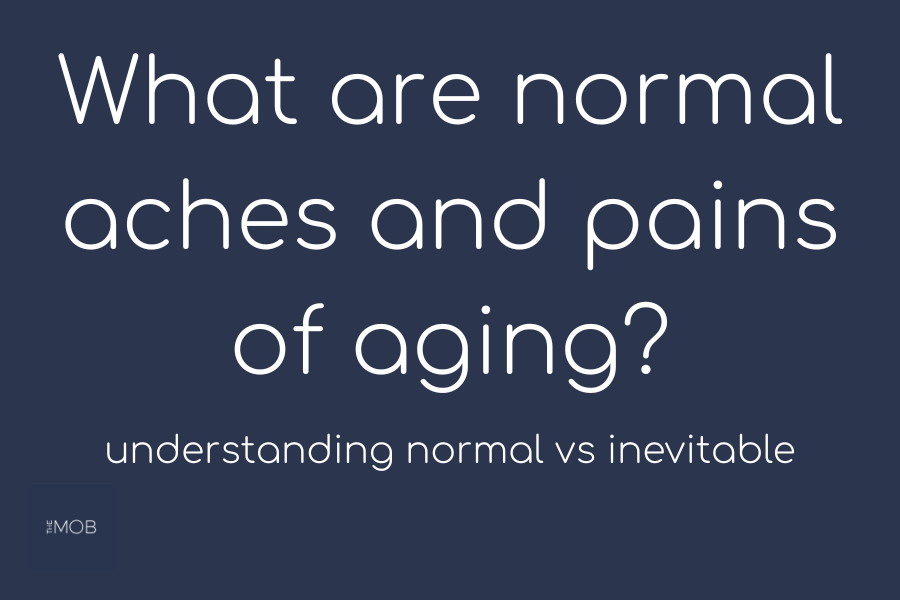What Are Normal Aches and Pains of Aging? Understanding normal vs. inevitable
What are normal aches and pains of aging?
Normal: conforming to a standard; usual, typical, or expected.
Inevitable: a situation that is unavoidable.
A woman gets on the Peleton at the gym. She tells her trainer that her shins hurt everytime she gets on the bike "because I'm in my 40's and I guess that's just what happens."
I mention to a friend in his mid-40's in conversation that I have good knees. He laughs and says, "Wow! That's a bold thing to say, who has good knees anymore?"
A hair stylist in his 60's says "Yeah I wake up with my hips aching every morning. It is what it is, I'm just old now."
A man in his early 70's who's new to training says, "I feel like the tin-man. I mean . . " he throws his hands up, "I'm in my 70's."
Everything those people are feeling are the normal aches and pains of aging. Normal is an average, it's a majority standard based on what's happening around us. But that doesn’t mean it’s inevitable. Those aches and pains don’t come with aging like a predetermined package. They come with spending years at a time neglecting mobility and strength training. Those statements are four of hundreds of examples I've heard over the years of people making conclusions about what they think someone should feel at a certain age with no other option to feel otherwise.
But then what about these people? Flo Meiler, Bill Stevens, Roshni Sangwan,Johanna Quaas, Orville Rogers -- they clearly aren't "normal". But they prove that what we see as normal isn't the only option.
Let’s re-define normal: the counterculture to falling apart
I turned 40 on August 30th. I'm one of those people that loves my birthday and takes it seriously. It's an opportunity for me to reflect and look forward, to recognize how far I've come and where I want to go. It allows me to continue to be an active participant in the direction of my life: to confirm or change the choices I make every day.
Two years ago, I was dreading the idea of turning 40. I felt I would officially be "not young" anymore, "past my prime" and snowballing forward into old age. So dramatic, right? That's how dramatic our culture is about aging unfortunately. Even though I was starting to talk more openly about ageism and the misrepresentation of our older adult population just having launched The MOB (and fully believed all of it!), I wasn't feeling confident in what 40 meant to me.
In the process of continuing to promote The MOB and the idea that our age doesn't define our physical fitness or our quality of life:
I've paid close attention to advertising rhetoric and how it perpetuates the normal = inevitable storyline.
I've read books and articles about anti-ageism and how to think about aging differently.
I’ve had in depth conversations with colleagues about the challenges in sharing this perspective as well as embodying it.
I've been inspired by older clients' attitudes and perseverance.
I've been successfully targeted with inspring Instagram stories of countless older adults accomplishing physical feats I may never be able to accomplish.
I've read research summaries about the adaptive capabilities of our bodies till the day we die.
Immersing myself into this parallel counterculture world has since transformed a perspective that I already believed into an actual embodied experience. Two years later, I can honeslty say, I'm so proud of having lived four whole decades. I'm proud of the experiences I've had and what they've taught me, the wisdom I've gained, yet how much life I still have to live and to experience. And I'm proud of how I feel physically which has had an undeniable impact on my confidence as a human in all other aspects of my life. Why am I proud? Because I wasn't bestowed strength and mobility from the gods above. I worked for it. And now I'm stronger and more mobile than I've ever been in my life. I'm here to shout from the top of the mountains that "THIS is what can happen to your body when you get older!!" And by THIS I mean strength and mobility and functionality to do what you want.
The decade doesn't matter because age doesn't define how you should feel. You can let time happen to your body, or you can use time to condition your body to feel better. And it's never. too. late.
"Stronger muscles and bones
are associated with longer life and better health.
And heavy lifting programs are proven to build strength.
If you combine those two ideas, the inevitable decline that comes with aging is perhaps not quite so inevitable."
Till next time, keep moving.
Related Reading:

